
8 Best VR Training Companies to Look for in 2025
8 Best VR Training Companies to Look for in 2024
Virtual reality training has shifted from a futuristic concept to a practical business tool. It’s no longer just gaming or entertainment. VR training companies are redefining how we learn, train, and develop skills.
Virtual reality (VR) is a simulated environment created using computer technology. It provides immersion by surrounding users in a three-dimensional, interactive experience. Today, VR training has outperformed traditional methods by driving more engagement and retention.
In this article, we’ll mention the top VR training companies leading the charge in 2024. We will see how they are delivering impactful results across various sectors.
What Is a VR Training Company?
A VR training company designs and delivers virtual reality solutions for workforce training. These companies use immersive VR technology to simulate real-world scenarios, helping employees gain hands-on experience in a risk-free environment.
For example, consider a nursing team preparing to manage their first ventilator patient. In a VR training session, they can practice everything from assembling and operating the ventilator to responding to emergencies like oxygen desaturation. All within a highly realistic but controlled virtual environment.
Without prior exposure, the pressure to perform in real life can lead to mistakes, stress, or worse—putting patient safety at risk. VR training eliminates this hurdle and helps build confidence before entering a critical setting.
How Does a VR Training Company Work?
VR training companies combine expertise in software development, 3D modelling, and instructional design. Their process often begins with an in-depth consultation to understand the client’s training objectives.
Custom VR scenarios are built using features like real-time feedback, performance tracking, and multi-user collaboration. Once deployed, these solutions can be accessed via VR headsets and online applications.
VR training companies may also offer ready-to-use scenarios for everyday industry training Manufacturing staff can be trained with pre-configured safety drills. Healthcare teams, for example, can choose from Lumeto’s 100+ immersive learning experiences.
Lumeto is a Canada-based VR training company for the healthcare and public safety sectors. Our platform, Involve XR, enables institutions to deploy data-driven, immersive training and assessment across their workforce.
VR companies may also provide ongoing support for software and custom scenarios to continue to meet evolving training demands.
Benefits of VR Training Software
The global virtual reality in education market is projected to grow from $17.18 billion in 2024 to $65.55 billion by 2032. The growth is majorly driven by the tangible benefits VR training offers to trainers and learners alike.
Here are some of the most impactful advantages:
Enhanced Engagement and Retention
VR training increases engagement by immersing learners in interactive and realistic scenarios. It activates multiple sensory pathways, strengthening learning and improving knowledge retention. Gamified VR training can also offer an engaging experience by incorporating challenges and rewards.
VR training companies also reduce cognitive overload compared to traditional methods. Instead of overwhelming learners with abstract theory, it provides immediate contextual relevance.
Lumeto conducted a research study with The American College of CHEST Physicians® on a VR airway management system. The results revealed a 16% average increase in procedural knowledge across all learners after just 25 minutes. Participants could easily onboard VR technology and complete critical procedures such as intubation, regardless of prior experience.
The VR sessions also ranked higher in learner satisfaction than traditional lecture-based methods.
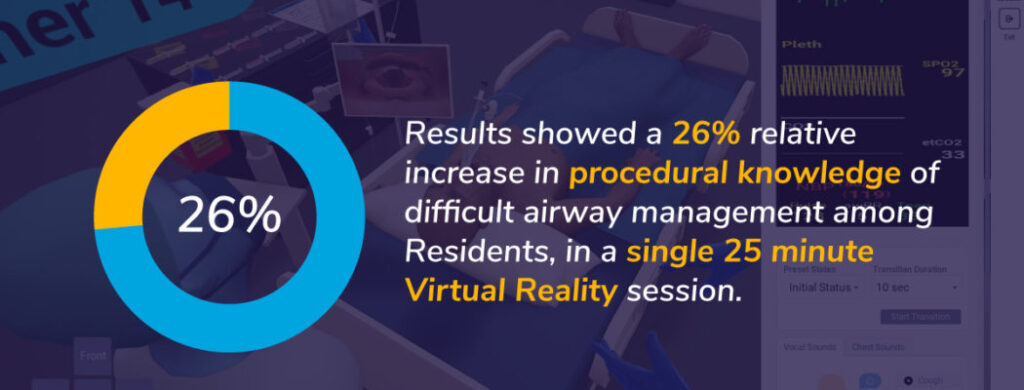
Improved Safety
VR training replicates risky scenarios in a controlled environment, eliminating the dangers associated with real-life practice. VR allows professionals to gain experience without real-world consequences, from hazardous environments to high-stakes medical procedures.
This is particularly important in the medical field, where medical errors contribute to an estimated 250,000 deaths annually. VR training prepares professionals to handle critical scenarios while safeguarding patient safety. For instance, medical trainees can practice intubating a VR patient (without risking an actual patient’s life).
Cost-Effective Training Solution
VR training companies reduce expenses compared to traditional methods by minimizing physical resource needs and operational costs.
- Medical: Replaces mannequins, supplies, and facility costs.
- Manufacturing: Avoids wear and tear on machinery.
- Aviation: Reduces flight simulator maintenance expenses.
- Military: Minimizes costs of live ammunition, vehicles, and specialized terrains.
VR complements and, in some cases, surpasses these traditional training methods. It makes sure learners receive the same quality of training without the recurring costs associated with physical resources or facilities.
Better Performance Tracking
VR training enhances performance tracking with AI integration and advanced data analytics, especially at scale. A VR training program can:
- Track learner actions throughout simulations.
- Handle large groups with consistent tracking and analytics.
- Compare learner performance against industry standards.
For example, Lumeto’s AI-powered Clinical Evaluator can monitor trainees’ decisions during a simulation. The software analyzes their adherence to clinical guidelines and provides actionable feedback.
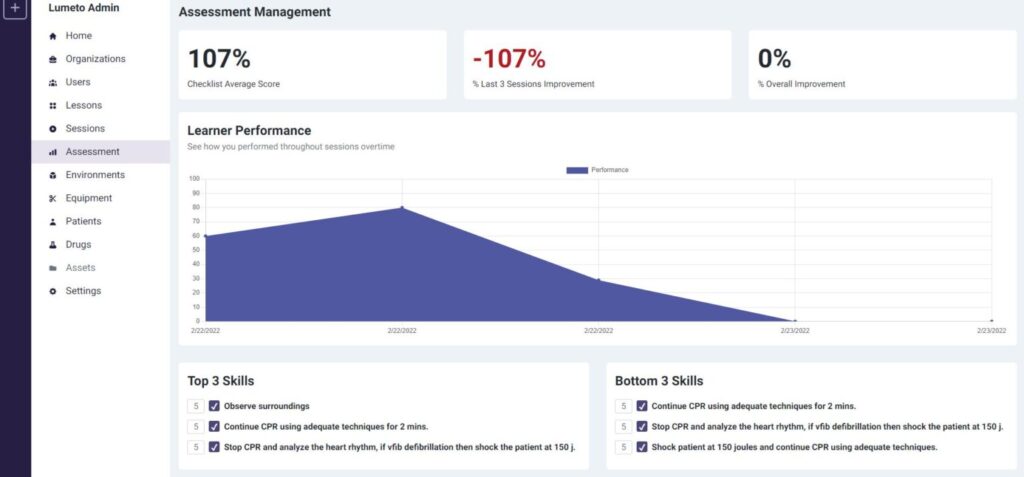
Customizable Training Programs
What sets VR apart is its adaptability. Custom programs can evolve as industries innovate. For example, a manufacturing company upgrading its machinery can modify its VR modules to train workers on the latest equipment without losing months to retrain physical machines.
While custom-built VR programs may sound expensive upfront, they often deliver a better return on investment over time.
Industry-Specific Applications of VR Training Solutions
VR training can be used across many industries. With new VR training companies entering the market, nearly every sector is integrating these solutions into their workforce development programs.
Here are some standout applications:
Healthcare
VR enables students to practice complex medical procedures in a risk-free environment. Some key applications include:
- Emergency Response Training: Doctors, nurses, and paramedics rehearse high-pressure scenarios like cardiac arrests or trauma cases.
- Patient Interaction Training: VR helps healthcare workers improve communication and empathy by simulating interactions with patients of varying conditions and backgrounds.
- Anatomy and Diagnostics: Medical students explore 3D anatomy or practice diagnosing conditions through virtual simulations.
At Lumeto, our AI-powered virtual humans provide lifelike interactions that closely mirror real-world patient experiences. An AI patient interacts similarly to an actual patient. They confidently prepare professionals to handle different personalities, conditions, and cultural sensitivities.
As Raja Khanna, CEO and Founder of Lumeto, explains:
Truly, what we’re unlocking is the access to high fidelity patient simulation that’s scalable, effective and, most importantly, adaptable to every learner, every trainer and every program. This means way more realistic experiential learning opportunities with optimized training resources. We’re very excited to be able to enable meaningful use cases of AI for healthcare training.
Raja Khanna, CEO and Founder of Lumeto
Manufacturing and Construction
Manufacturing and construction often involve high-risk tasks where errors can result in injuries or financial loss. VR allows workers to make and learn from mistakes in a controlled environment.
For example, a new crane operator can practice lifting loads and managing balance in VR, gaining confidence before working on an active construction site.
Volkswagen utilizes VR to train their thousands of employees in in production and logistics.
Corporate: Leadership training, soft skills, and employee onboarding.
Corporate training often struggles with engagement and relevance. VR overcomes these challenges by immersing employees in lifelike situations.
VR training companies create emotionally charged, context-specific learning environments that stimulate long-term behaviour change. For example,
- Managers can practice delivering critical feedback.
- New hires can virtually tour their future workplace.
- Employers can evaluate employees’ current skills.
Walmart uses VR to immerse employees in realistic scenarios, such as customer service interactions.
Education
VR levels the playing field in education by breaking down barriers of geography, accessibility, and resources. A student in a rural area can explore the Louvre, while a child with autism can practice social interactions in a controlled, supportive environment.
Students can explore historical landmarks, visit far-off countries, or even dive into the ocean, all from their classroom.
Google Expeditions enables students to visit various locations virtually, such as historical landmarks and natural wonders
Retail and Customer Service
VR is changing how retail and customer service employees learn to interact with customers and sell products. Because VR is risk-free, employees can make mistakes, try different approaches, and build confidence without pressure.
Bank of America has become the first financial services company to implement virtual reality (VR) training across nearly 4,300 financial centers nationwide.
Best VR Training Companies in 2024
Here are the best virtual reality training companies in different industries:
Lumeto — Best VR Training Company for Healthcare
Lumeto is a leading VR training company in the healthcare sector. OurInvolveXR platform provides an interactive environment that improves both clinical and communication skills.
Lumeto has the largest library of adaptable, competency-mapped learning experiences for the medical field. The scenarios can be delivered as-is or customized to suit unique learning objectives.
Lumeto has successfully launched the first-ever customizable conversational AI in VR for patient communication. Medical trainers can use AI-powered patients that:
- Respond dynamically to learner input, simulating real-life conversations.
- Exhibit emotional responses like fear, anger, or confusion to challenge learners.
- Provide instant feedback based on how learners communicate.
- Adapt to different cultural contexts or linguistic nuances for global training needs.
- Challenge learners with evolving conditions that require immediate action.
Lumeto’s involveXR platform features a low learning curve, supported by interactive onboarding and training tools. Those who have used Lumeto report high comfort levels and greater satisfaction with the platform.
Strivr — Best VR Training Company for Enterprise Workforce Development
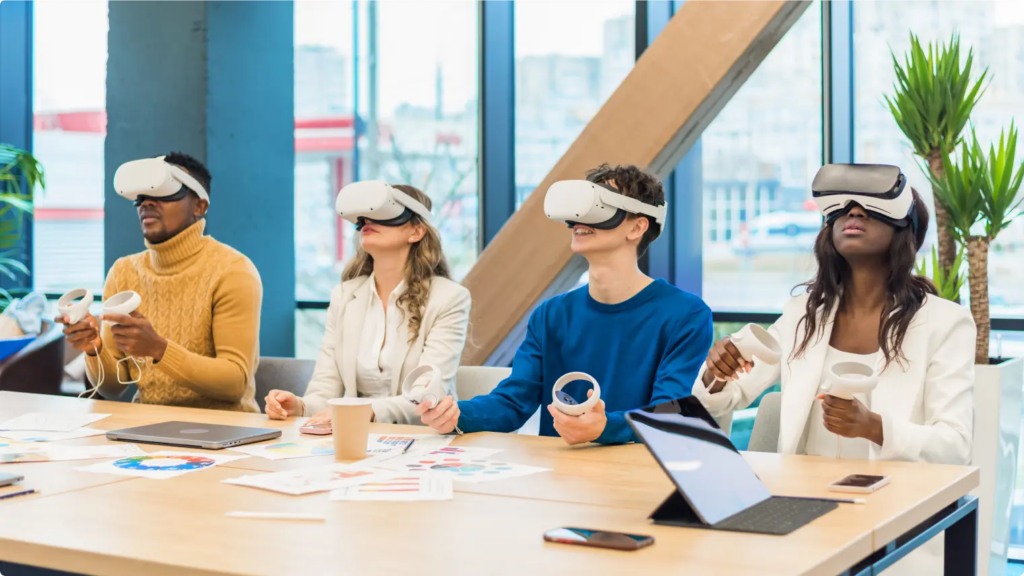
Strivr is a leading provider of immersive learning solutions for enterprise workforce development. Their platform delivers AI-backed learning experiences through extended reality (XR), encompassing VR, augmented reality (AR), and mixed reality (MR).
Strivr’s VR training solutions are used across various sectors, including retail and financial services, to improve customer service and develop leadership skills. Strivr’s platform has facilitated over 2 million VR training sessions across various industries.
Talespin — Best VR Training Company for Soft Skills Training
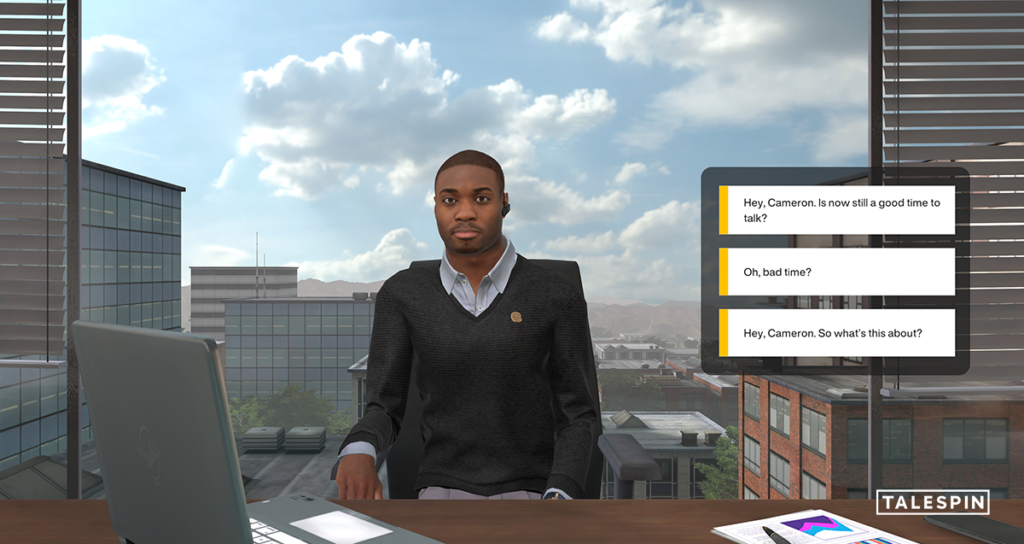
With Talespin VR, employees engage in realistic scenarios to enhance soft skills such as communication, leadership, and empathy.
Talespin’s platform offers a comprehensive suite of tools, including a no-code content creation tool. It allows organizations to develop custom VR training simulations without the need for programming expertise.
A notable collaboration between Talespin and PwC assessed the effectiveness of VR in soft skills training. The study revealed that VR-trained employees completed training up to four times faster than classroom learners and were 275% more confident in applying their new skills. Additionally, these employees felt a 3.75 times stronger emotional connection to the training content than in traditional classroom settings.
Avantis — Best VR Training Company for Classroom Learning
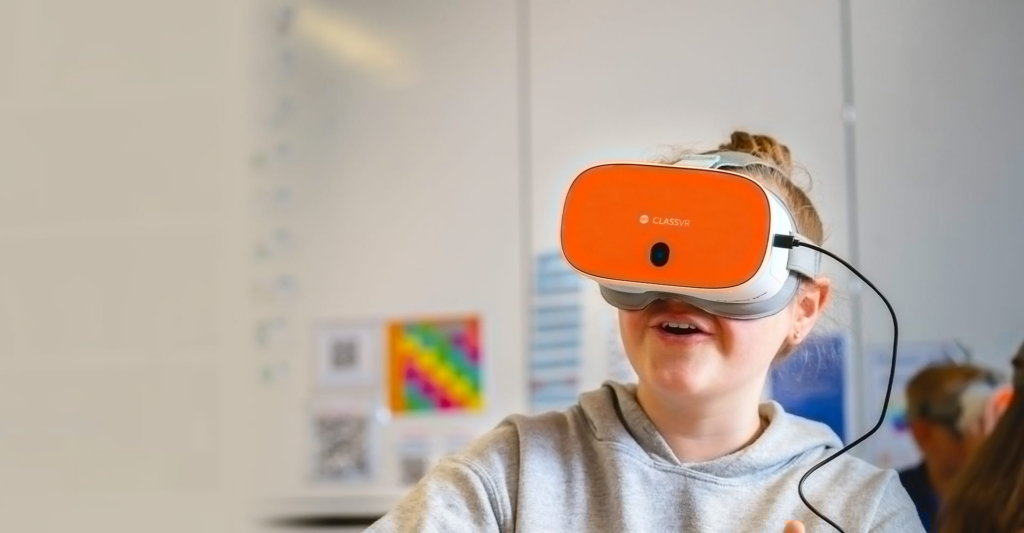
Avantis Education has distinguished itself as a leading provider of virtual reality (VR) solutions for classroom learning. Designed specifically for educational environments, their platform ClassVR offers:
- A comprehensive package that includes user-friendly VR headsets.
- Extensive library of curriculum-aligned content.
- Intuitive classroom management tools.
The ClassVR platform enhances student engagement by allowing learners to explore subjects through interactive 3D experiences. For example, students can virtually walk with polar bears or travel back in time to experience historical events firsthand.
ClassVR has received multiple accolades, including the Educators Pick Best of STEM® 2024 Award in the Trailblazer: Immersive Reality (AR/VR) category.
Apex Officer — Best VR Training Company for Police Training
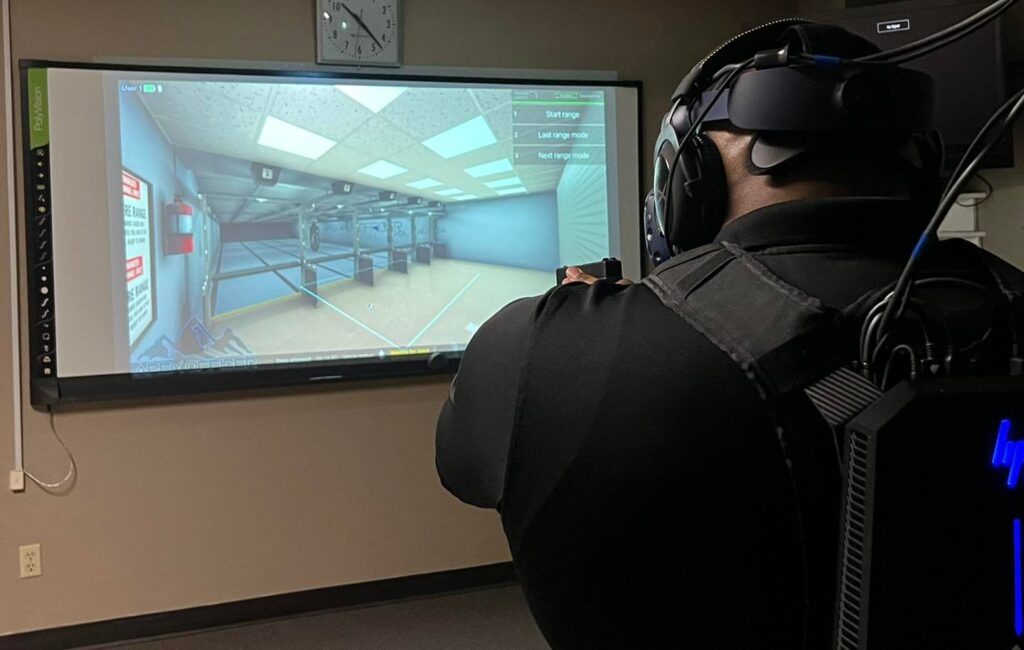
Apex Officer’s VR training system is used by various law enforcement entities across all 50 states, including police departments, sheriff’s offices, and training academies. The platform enhances law enforcement officers’ proficiency in several key areas:
- De-escalation techniques
- Use-of-force decision-making
- Crisis intervention
- Situational awareness
- Communication skills
- Stress management
In addition to standard training scenarios, Apex Officer has introduced specialized modules such as a virtual reality driving simulator. All scenarios are powered by artificial intelligence and machine learning to closely mimic real-life encounters.
IMPROVR — Best VR Training Company for Sports

VR sports training helps with improved muscle memory and better on-field performance. IMPROVR focuses on sports training for tennis, soccer, basketball, and more. They offer individualized, sport-specific exercises for professional athletes and general exercises for amateurs.
Their VR system provides instant feedback during VR training sessions, allowing athletes to analyze their performance and receive guidance to optimize their skills.
XpertVR — Best VR Training Company for Firefighting
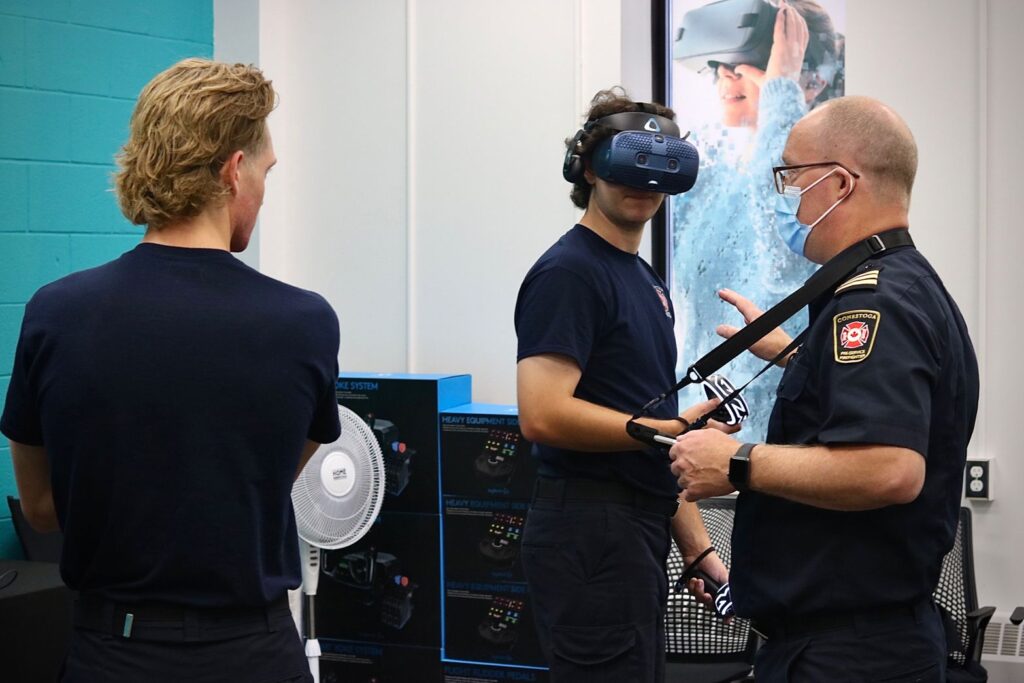
XpertVR’s flagship platform, XpertFire, offers simulations replicating real-world fire scenarios. Firefighters can prepare for various critical scenarios using XpertVR’s XpertFire training platform, including:
- Search and Rescue Operations: Navigate through smoke-filled environments to locate and rescue victims.
- Fire Suppression Techniques: Practice extinguishing different types of fires under varying conditions.
- Hazardous Material Incidents: Manage fires and spills involving dangerous substances safely.
- Equipment Proficiency: Use tools like axes, halligan bars, and radios properly in simulated settings.
How to Choose a Virtual Reality Training Company
Here’s how to identify the best VR training company for your needs.
Specialization and Expertise
Consider whether the company has experience in your specific industry or training requirements. A provider specializing in K-12 education may excel at engaging young learners but might fall short in preparing medical professionals for critical, high-pressure scenarios. For healthcare training, Lumeto stands out with its tailored solutions built for the field. The platform is supported by a Learning Advisory Board boasting over 100 years of combined clinical expertise.
Customization Options
A great VR training platform should adapt to your organization’s needs—not the other way around. Training programs are not static; as your institution evolves, so should the scenarios you provide. The ability to customize training makes sure that the content stays relevant, realistic, and impactful.
Customization is especially vital in healthcare, where every medical case is unique. It allows trainers to tweak scenarios to reflect diverse challenges and prepare learners for real-world situations.
For instance, Lumeto’s InvolveXR empowers medical trainers to adjust a wide range of elements, including:
- Patient’s dialogues
- Patient’s behaviours
- Scenario complexity
- Patient’s condition and vitals
- Interactive elements
- Assessment metrics
Customer Support and Training
Strong customer support is the backbone of any successful VR training implementation. Here’s what to look for:
- Instructor Training (Remote): Comprehensive remote training sessions equip your instructors with the knowledge to seamlessly integrate VR technology into their teaching.
- Dedicated Customer Success Manager: Having a single point of contact makes sure your institution receives personalized support and guidance.
- On-Demand Tech Support: Immediate access to technical assistance minimizes downtime and makes sure your training sessions run smoothly.
Conclusion
VR training is changing how professionals are prepared for the real world. Medical institutions are also increasingly embracing VR to improve their educational processes.
Lumeto makes this possible for hospitals, nursing schools, and healthcare organizations. With tools like customizable scenarios and AI feedback, it’s easier than ever to train medical staff for real-life challenges.
Want to see how Lumeto can help? Book a demo today and experience the future of healthcare training.
Frequently Asked Questions About VR Training Companies
How much does it cost to implement VR training?
Costs for VR training vary widely depending on the provider, level of customization, hardware requirements, and the number of users. A typical range is $20,000 to $150,000 or more. Customized and high-end enterprise solutions tend to fall on the higher end of the spectrum.
Can VR training be adapted for people with disabilities?
Yes, VR training can be designed to accommodate various needs, such as providing voice commands, haptic feedback, or visual adjustments for better accessibility.
Is VR training suitable for remote teams?
Yes, some VR training companies can deploy remotely, allowing learners from various locations to participate simultaneously. With cloud-based platforms like Lumeto, institutions can provide access to VR training sessions anywhere.